Which isn't to say that Shaffer's play isn't enormously well written, or that its preoccupations with sex and worship aren't worth considering today. And Nearly Naked Theatre's production of Equus proves that Shaffer's story can still titillate and thrill an audience.
Equus (Latin for "horse") tells the story of Alan Strang, a disturbed teenager referred to psychiatrist Martin Dysart after the boy blinded six horses with a hoof pick. Dysart specializes in psycho kids, and Alan is a real nutbox who at first speaks only in advertising jingles and won't cop to his sick obsession with his horse-god Equus. Shaffer's own sick twist -- and what makes the story still so compelling -- is the notion that the good doctor envies his young and unstable charge's passion, an emotion that Dysart has long been lacking in his own life.
Director Damon Dering's Equus (which, according to his director's notes, he's fantasized about directing for years) is bursting with passion -- for striking imagery (a stable full of restless, leather-clad "human" horses) and for memorable scenemaking (the climactic horse slaughter, quick but frightening). Dering has put more energy into the naughty scenes, particularly one set in a passion-pit cinema, where trench-coated men lurk in a tangle, and the climactic scene wherein Alan describes his aborted attempt at lovemaking.
Would that Dering had dumped the British accents that place our story in England and with which several supporting players struggle. Rebecca A. Siegel, as a social worker assigned to Alan's care, is an exception -- and an exceptional performer who elevates her smallish role to principal status. Young Daniel Sykes is a find, a gifted actor lacking only a little flash, who nonetheless hits every emotional high note Alan is handed, whether it's crowing in pain or singing a chewing gum commercial. The showiest of the roles belongs to Charles Sohn, who must slowly reveal to us Dr. Dysart's demons while curing the boy of his own. Sohn's doctor is an intelligent, self-aware loser who's never self-pitying, so we discover his failings with nothing less than sympathy.
Set designer Gregory Jaye's rustic stable of crooked, splintered planks provides a stunning backdrop for a herd of Jay Templeton's gorgeous wire horse heads. Bryan Schlegel enhances pivotal scenes with creepy muttering and chanting from just offstage; the eerily claustrophobic effect is repeated in a dream sequence full of smoke and shadows courtesy of Nykol De Dreu's extravagant lighting design.
Equus is known as much for its full-frontal nudity as its now quaint moral about how the grip of modern technology has loosened our hold on larger life issues like religion and pain. On opening night of Nearly Naked's first-ever sold-out show, the notorious nude scene in which two young people prepare to make love sent one audience member fleeing for the lobby. Those of us who stayed were treated to a rare night of truly memorable theater.










